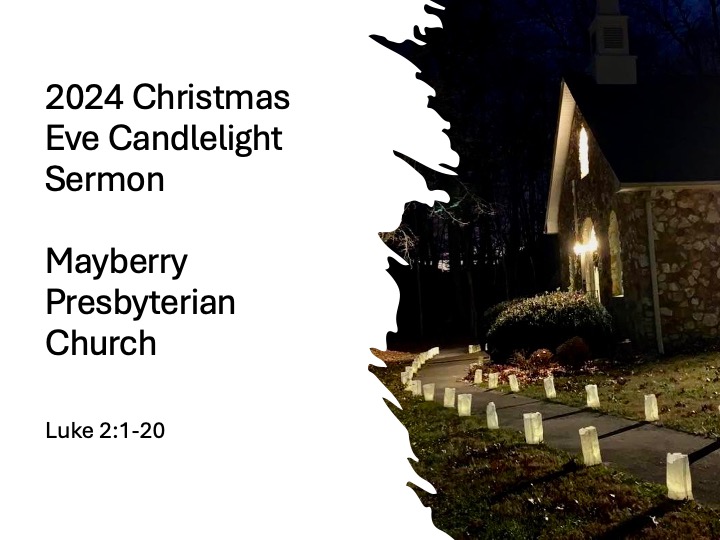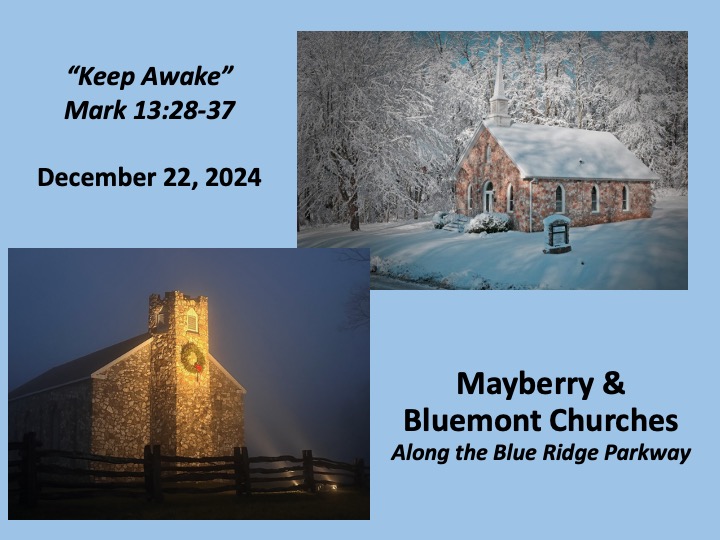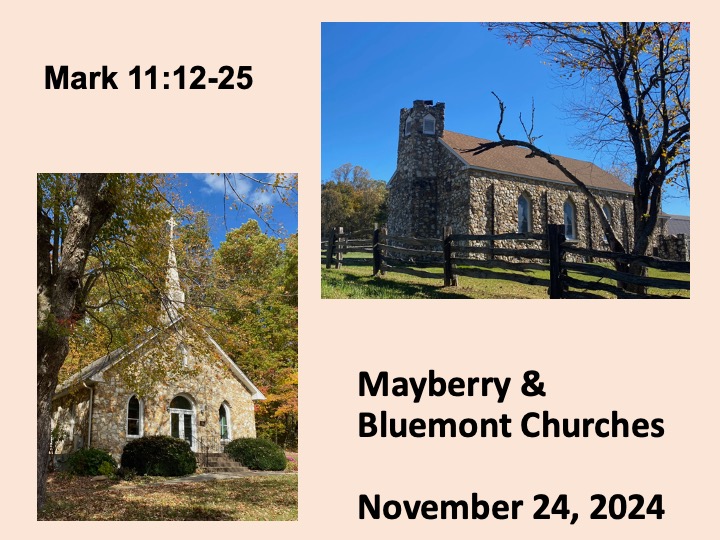Jeff Garrison
Bluemont and Mayberry Churches
January 5, 2025
Jeremiah 31:7-14
At the beginning of worship.
How many of you agree with this statement: “God helps those who help themselves?” Too many mistakenly attribute the statement as coming from the Bible, even though the Holy Book contains no such proverb. God helps those who help themselves may be the identifying proverb of American civil religion, but it has nothing to do with Christianity (or Judaism for that matter).
Instead, Scripture provides a picture of a God who helps those who can’t help themselves. If you are a member of this church, you have affirmed this by admitting your sinfulness and your need for a Savior. You can’t save yourself. As humans, we are frail; only with God are all things are possible.
Walter Bruggerman, a retired Old Testament professor, once proposed a twofold task for a preacher… On the one hand, the preacher’s task is to reach those who are only concern are themselves, those who think only about “me.” We live in a conceited age and many of us are caught in this trap where we think so ourselves, leaving little room for God. This results in a trap within our own limitations. In the end we are alienated from each other and from God.
On the other hand, Bruggerman identifies an opposite group of people, those who cease to think of themselves as important and exaggerate God to such a degree in which Almighty is so big and tall that we, as mere mortals, have no real contact. Faced with the goodness of such a God, we see ourselves as inept, often leaving us with a feeling of rage. God became a person in Jesus Christ especially to reach this latter group of people.
However, in front of God, both groups—those who exaggerate the self and those who exaggerate God, those who experience alienation and those who endure rage—are reduced to silence. We cannot have a conversation with each other or with God when we’re locked into our own little worlds, nor can we talk to God when we feel God is so big he does not care about us.
Yet, deep inside this silence many in our society experience is a longing and yearning for communion. We need to address such yearnings.[1] We speak to the human desire to reconnect to the Creator. After all, God is the only one with the power to redeem and sustain life.
Before reading of the scriptures:
After spending last year working through the gospel of Mark, I will spend some time in the Old Testament for the next few weeks. It’s important that we balance the two, for only then can we come to a more complete understanding of God.
Our morning reading from Jeremiah affirms a basic Christian belief, one at the heart of Presbyterian theology. The God who gives us the breath of life is also the God who, when we find ourselves alienated from him, calls us back to speech. We’ll hear this in the opening verse when the Lord, through the prophet, calls on Israel to “sing aloud, raise shouts, proclaim and give praise.”
But let’s put this reading into context. Jeremiah was a prophet of doom. His words mostly fell on deaf ears. Other prophets promised good things happening to Israel, even while the nation rotted, and the armies of Babylon laid siege to Jerusalem. They threw Jeremiah into a cistern because the people grew weary of hearing his negativism. But as the siege continued to strangle Jerusalem, and the court prophets were proved wrong, Jeremiah seems to switch. He offers a hopeful word for the future.[2]
Some probably laughed at Jeremiah. They knew the Babylonians would break through the walls at any moment. Jeremiah’s words are a hopeful dream, with a promise in the distant future. God, speaking through Jeremiah, assures Israel there will be a new day coming. Only God has the power to restore, and Israel is reminded, once again, not to lose faith, but to draw close to God.
Read Jeremiah 31:7-14
Jeremiah emphasizes salvation comes from God. God offers salvation to those unable to help themselves. Jerusalem faces death and exile soon. God, however, promises to gather and lead back to the Promised Land, the blind, the lame, the children, and women who are in labor. Each of these groups are people dependent on others, who can’t survive by themselves. They depend upon the mercy of others and when there is no one to help them, God is the one who hears and answers their pleas for help.[3]
In verse 11, we hear of the Messianic hope we have in Jesus Christ. God plans to ransom back his people. Jesus, we believe, atones for our sins.[4] In other words, Jesus pays the ransom for our release from bondage.
As we come to the end of the passage, we witness the joy experienced by the remnant of Israel who will be saved. As we’ve seen, they dance and sing and make merry; they are satisfied with the bounty provided by God.
Against the backdrop of our relative wealth, I wonder what this passage might say to us. After all, we pride ourselves on self-sufficiency. We have a difficult time understanding Jesus’ words from the beatitudes, “Blessed are the poor for theirs is the kingdom of God.”[5] It’s hard for you and me to see how someone poor can be blessed; they’re not exactly complimentary terms. Jesus also tells us how hard it is for someone who is rich to enter the kingdom of heaven.[6]
Turning our lives over to God isn’t popular nor is it seen as necessary in a society priding itself on wealth. It’s harder to see the need for God in our lives and often, it’s only when someone is deathly sick or when misfortune strikes that many people see the light.
We’ve been blinded from the source of life. As Brueggerman, whom I spoke about earlier, points out, our alienation and rage keep us from seeking such a source. We either think we’re self-sufficient or that God doesn’t care, both of which bar us from the foundation of life.
Maybe we’re like Frank, in the Frank and Ernest comic strip. After a date with Francine, Frank gloated about how he was sure she was going to be true. After all, she told Frank, “You are the last man I want to see at my door.” We don’t experience the world the way it truly is… We all need to wake up and accept our dependence upon the author of life and salvation.
The longest held hostage in Lebanon. Terry Anderson asked another hostage, Catholic priest, if he could confess his sins to him. The priest was shocked and remarked, “This is interesting, you being an innocent victim, wanting to confess your sins.” Anderson replied, in a way that exposes his understanding of God and the human condition, “well, there’s quite a few of them in need of confession.”[7]
All of us, whether we realize it, need God in our lives. And we must make room for God by confessing our self-centeredness and our rebellion against God to open in our lives a place for God to exist. Only then will we hear that call of God to join in song, to dance and to be merry. Only then will that yearning inside of us, a yearning often speechless, be given voice.
Salvation is from God for those unable to help themselves. If we feel alienated and cut-off from God, like those whom Jeremiah addressed, we need to hold on to the hope God is with and for us. We need to let God know our dependence on him in all things. Those dependent on God receive an invitation to be in communion with the one who request our presence at his table which is a foretaste to what is to come. Let us celebrate the Lord’s Supper. Amen.
Note: I edited this sermon from one I preached on January 5, 2003.
[1] Walter Bruggerman, Finally Comes the Poet, (Minneapolis: Fortress, 1989), 43-47.
[2] Creating a timeline for Jeremiah and Jerusalem’s fall is difficult as the prophet’s book appears mixed up. Jeremiah ends up in the cistern in chapter 38.
[3] See Exodus 22:21-24.
[4] See Matthew 2:21
[5] Luke 6:20.
[6] Mark 10:25, Luke 18:25.
[7] National Public Radio, December 1993.















